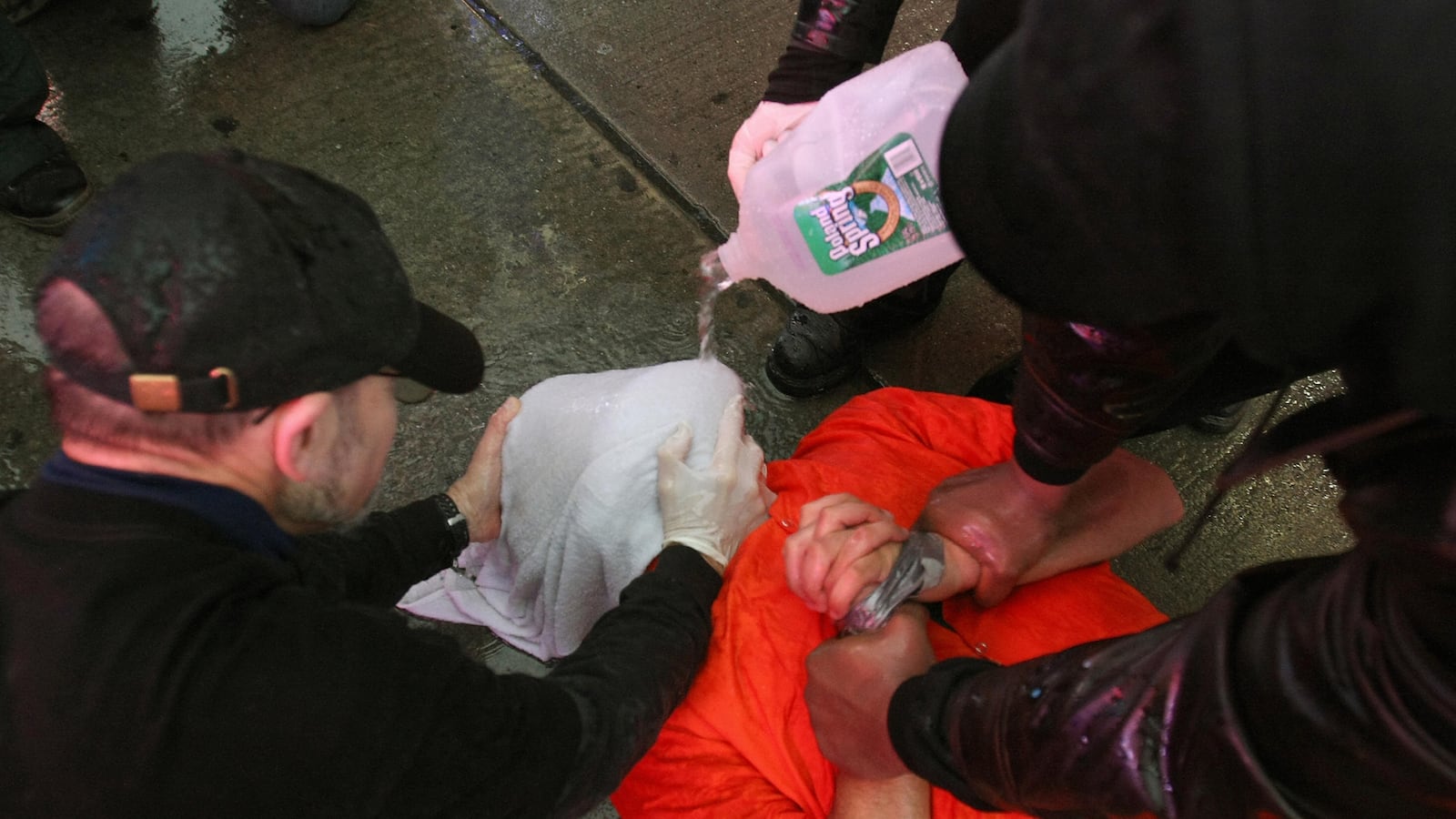“The American people were demanding that the government do anything necessary to keep the country safe.” That has become a talking point exonerating American torture after 9/11, which a Congressional investigation has recently recently detailed. It is a convenient story: the government was faithfully obeying the people, and the people were shocked by events, freshly aware that the world is a dangerous place. Understandably, mistakes were made.
This story is almost criminally wrong. The 9/11 attacks were shocking and frightening, of course. They did just what terrorism aims to do: shattered the unthinking, complacent security of a peaceful country, and revealed the fragility of things.
It was also a hugely open, uncertain moment. People were scared but, just as much, confused. We had no mental category for such an attack. I vividly recall, that day and the weeks afterward, people groping for a decent way forward. Should we cancel gatherings, reunions, excursions, or throw ourselves into them with even more gratitude for one another? Should we stay away from cities or flood into them? Nothing was obvious.
Most of all, it was not obvious that the government would soon throw itself into kinds of violence and surveillance that had been almost unimaginable during my post-Vietnam lifetime. There was no spontaneous call for torture—nor, for that matter, for war in two countries, only one of them even arguably connected with the attacks. The policies that followed were not serving democratic demands.
Instead, politicians and pundits rushed to tell the public what the events meant. George W. Bush’s “axis of evil” and “war on terror” militarized national consciousness and drove political language far from pragmatism and nuance toward black-and-white absolutes. Centrist pundits like Thomas Friedman said war was justified to show American resolve and set Arab countries back on their heels—telling them to “suck on this,” as Friedman put it. Fear and belligerence ran together.
At the same time, pundits began normalizing talk of torture, which for decades had been beyond the pale. Alan Dershowitz wrote in 2001 that torture should simply require a warrant. This was ostensibly to extend the rule of law by guaranteeing due process, but the real effect was to corrupt law and morality by bending them to make torture seem normal and lawful. Five years later, after the first revelations of “black sites” and “extreme rendition,” Charles Krauthammer was still arguing that “It would be a gross dereliction of duty for any government not to keep Khalid Sheikh Mohammed isolated, disoriented, alone, despairing, cold and sleepless, in some godforsaken hidden location.” He did not mention rectal feeding, but perhaps he was not fully briefed.
Arguments for torture tended to start with the “ticking time bomb” scenario, the hypothetical in which a bomb is about to go off and only the torture victim knows how to defuse it. But this was just the opening move. The real effect of constant fear-mongering, whether for political gain or to promote wars whose advocates thought they would be geopolitically constructive, was to make everyday life feel like the ticking-bomb scenario, to make fear an ordinary emotion, and no-holds-barred violence an ordinary response.
It was also an occasion for voluptuary displays of tough-mindedness. A certain kind of intellectual loves to show that he (usually he) is no pussy, that he can stand up with the toughest tough guys—usually by sending the actual tough guys, soldiers and CIA operatives, on life-threatening and destructive missions. Disgustingly, this testosterone-injected preening was a major note, sometimes the dominant one, in political leadership for seven years after 9/11.
The eventual public revulsion at the wars and the torture shows a deep and abiding potential for decency, which reasserted itself in the face of huge pressure to embrace state violence, big and small, as the new normal. Turning now to blame the American people for that violence is especially repellent for this reason.
Moreover, no one’s hands are clean here, and blame shifting tends to dissolve the issue when what we really need is a reckoning. It’s true that the country went along too easily with fear and violence. It is also true—and this is inconvenient—that the US had not been innocent in the decades leading up to 9/11. Our proxies in Latin America, from Pinochet’s Chile to the death squads of El Salvador, tortured their countrymen, often for advocating democracy. When torture became US policy, it was a kind of terrible homecoming; but no one in the countries where our proxy wars were fought could imagine that the US had much innocence to lose.
Here at home, though, we did. It is a cliché that war tests a country; but it is at least as true, and much easier to overlook, that a people has to be worthy of civilian life. A world of peace, personal freedom, and social fairness, a world centered on the ordinary life of family, work, and neighborhood, is a precious achievement that deserves defense. Defending it properly means preserving its values—principles of decency and humanitarianism—not putting up a fence of violence and fear around it.
The race to torture and war after 9/11 betrayed the principles of civilian life. Maybe there is some connection between that betrayal and the fearful violence we have tolerated in mass incarceration and excessive, unresponsive policing. Maybe the movement now growing around police violence and the racial inequities of the criminal justice system is, in some oblique way, an attempt to take back and extend the civilian value of shared peace and decency that fell from our grasp after 9/11. If so, we still have a long way to go in overcoming the consequences of permanent war, the policy—and the national story—that the country adopted after the attacks.
Either way, we Americans have plenty to answer for and reckon with. But demanding torture and war is not on that list. Leaders with political and intellectual responsibilities conjured up those evils, and the results are on their hands.






